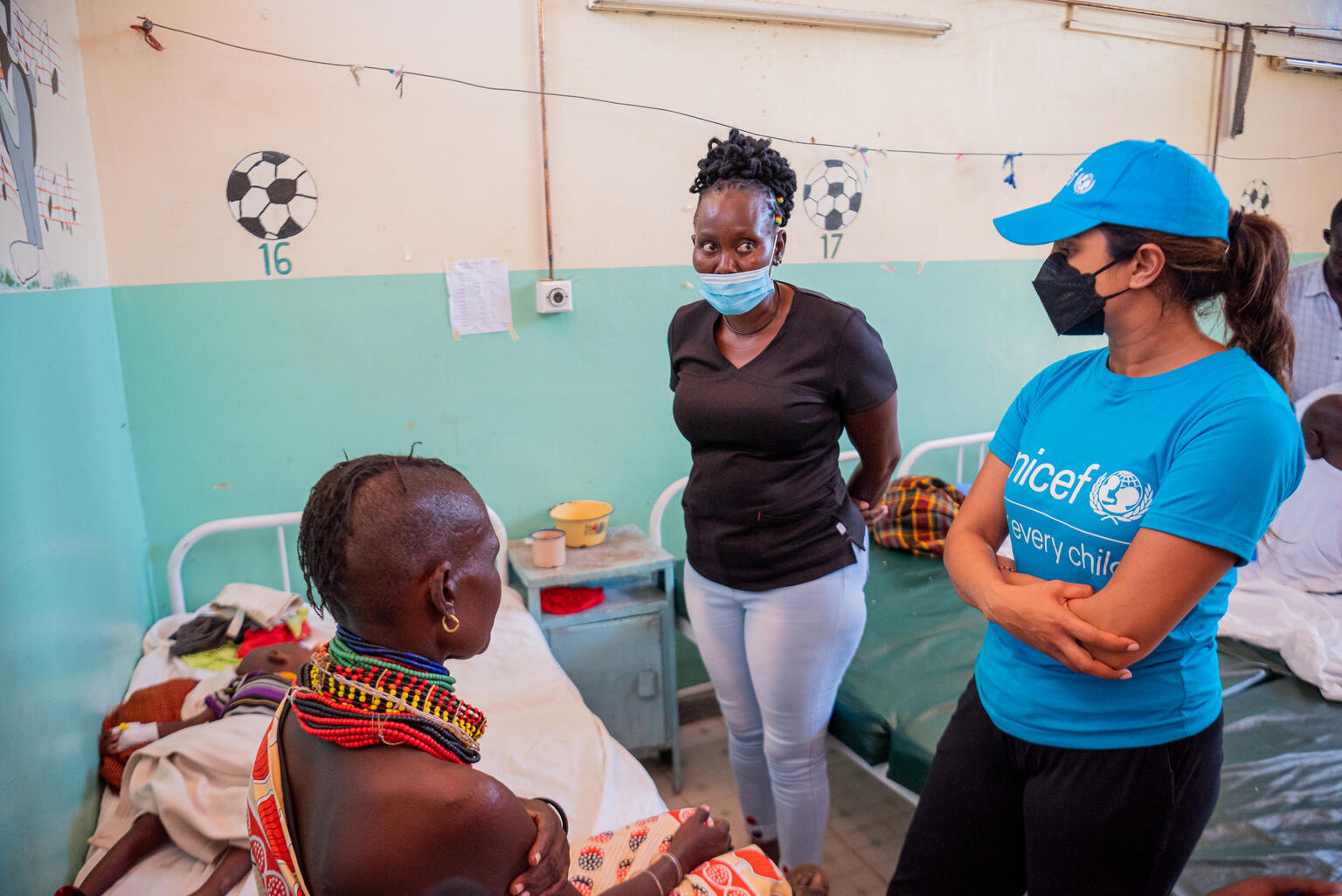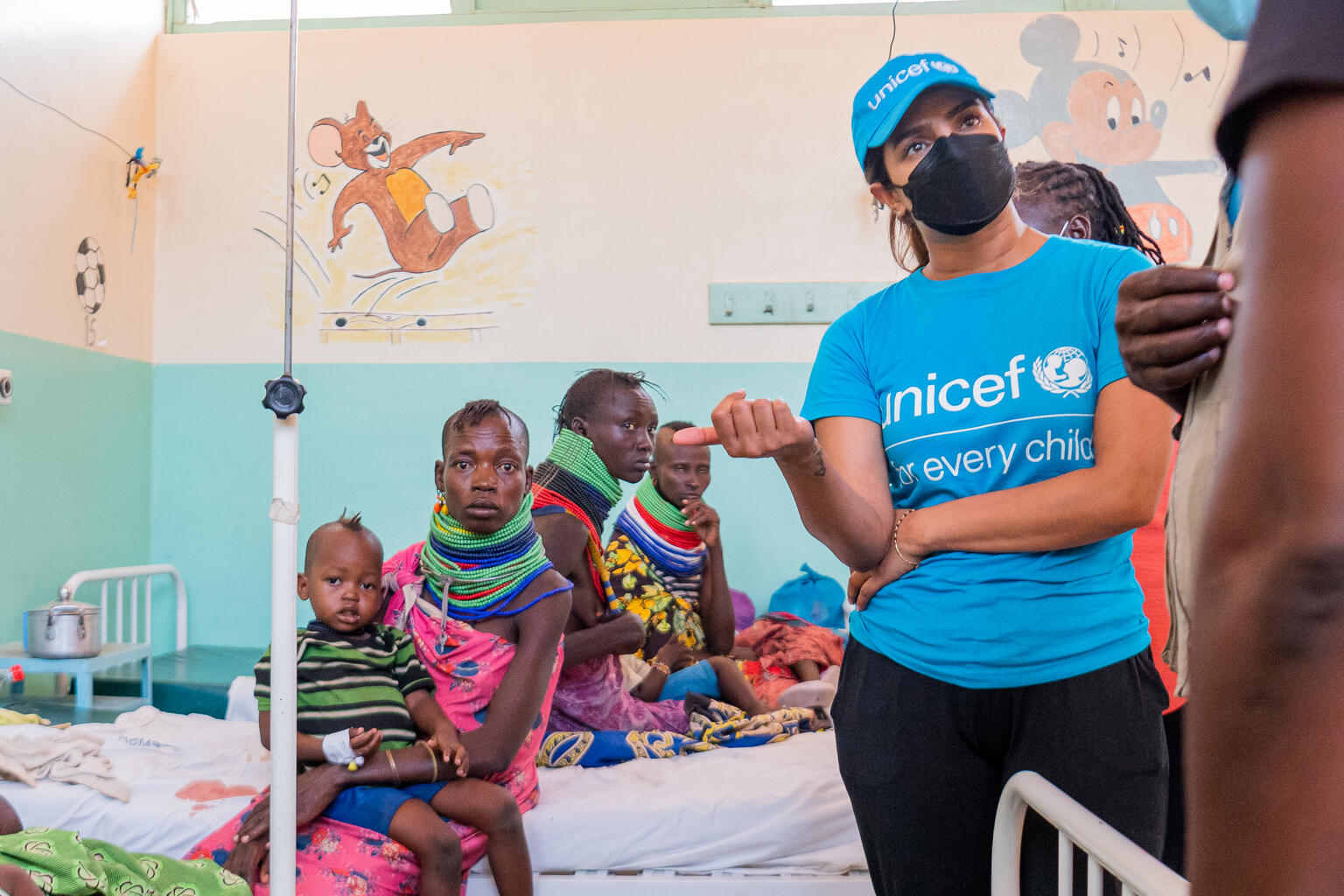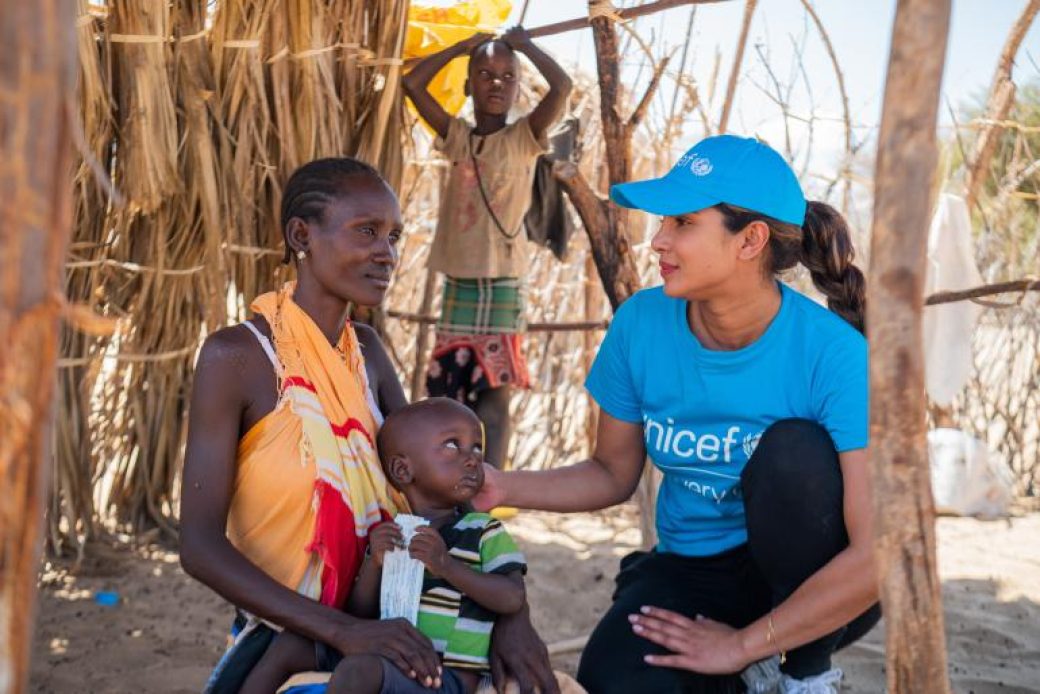UNICEF Goodwill Ambassador Priyanka Chopra Jonas meets children suffering from severe malnutrition in Kenya
UNICEF Goodwill Ambassador Priyanka Chopra Jonas travelled to northern Kenya this week to meet children suffering from severe acute malnutrition as a result of prolonged drought across the Horn of Africa.
During the two-day visit, Chopra Jonas travelled to Turkana County – among 15 drought-affected counties in Kenya due to climate change and the ongoing impacts of COVID-19 – where almost 1 in 3 children are suffering from acute malnutrition. Nearly 900,000 children under the age of 5 in affected counties are in need of treatment for life-threatening severe acute malnutrition, also known as severe wasting.
https://youtu.be/U6UpIMl13Qs
In Kenya, the last four failed rainy seasons have left 1.4 million children with reduced access to nutritious food, safe drinking water, health services, education, and protection from violence and neglect. A predicted fifth poor rainy season is expected to worsen the situation, leading to more children and families needing humanitarian assistance.
 In response to the crisis in the Horn of Africa, UNICEF is scaling up nutrition services and distributing therapeutic milk and ready-to-use therapeutic food (RUTF) to health centres, as well as supporting governments to identify and treat children with malnutrition in the hardest to reach areas.
“UNICEF has been working tirelessly with governments and other partners to minimise child deaths in the most difficult of circumstances,” said UNICEF Kenya Acting Representative Jean Lokenga. “This dire situation could get worse, especially if the next rainy season fails or life-saving commodities such as RUTFs become unavailable due to funding shortfalls. There is a desperate need in Kenya and the region for additional and sustained response to this crisis. We are grateful to UNICEF Goodwill Ambassador Priyanka Chopra Jonas in helping us raise much needed awareness of the drought response appeal, and ensure every child has access to life-saving assistance.”
In response to the crisis in the Horn of Africa, UNICEF is scaling up nutrition services and distributing therapeutic milk and ready-to-use therapeutic food (RUTF) to health centres, as well as supporting governments to identify and treat children with malnutrition in the hardest to reach areas.
“UNICEF has been working tirelessly with governments and other partners to minimise child deaths in the most difficult of circumstances,” said UNICEF Kenya Acting Representative Jean Lokenga. “This dire situation could get worse, especially if the next rainy season fails or life-saving commodities such as RUTFs become unavailable due to funding shortfalls. There is a desperate need in Kenya and the region for additional and sustained response to this crisis. We are grateful to UNICEF Goodwill Ambassador Priyanka Chopra Jonas in helping us raise much needed awareness of the drought response appeal, and ensure every child has access to life-saving assistance.”
 As of 14 October 2022, the current outlook in Kenya is the worst in the last 40 years, with a high likelihood of a fifth failed rainy season for October, November, and December expected to increase the number of people facing food insecurity from 3.5 million to 4.35 million. SMART surveys conducted in June/July 2022 show a significantly deteriorating nutrition situation in Arid and Semi-Arid Land regions (ASAL), with almost 1 in every 2.4 children suffering from malnutrition in Turkana South, one of the most affected areas. 8,071 children (4,107 girls and 3,964 boys) were admitted for treatment of severe acute malnutrition and 168,067 primary caregivers of children received infant young child feeding counselling in target counties during the reporting period.
UNICEF is on the ground responding to the drought emergency by supporting countries in the region in the sectors of Water Sanitation and Hygiene (WASH), nutrition, education, child protection, among others.
As of 14 October 2022, the current outlook in Kenya is the worst in the last 40 years, with a high likelihood of a fifth failed rainy season for October, November, and December expected to increase the number of people facing food insecurity from 3.5 million to 4.35 million. SMART surveys conducted in June/July 2022 show a significantly deteriorating nutrition situation in Arid and Semi-Arid Land regions (ASAL), with almost 1 in every 2.4 children suffering from malnutrition in Turkana South, one of the most affected areas. 8,071 children (4,107 girls and 3,964 boys) were admitted for treatment of severe acute malnutrition and 168,067 primary caregivers of children received infant young child feeding counselling in target counties during the reporting period.
UNICEF is on the ground responding to the drought emergency by supporting countries in the region in the sectors of Water Sanitation and Hygiene (WASH), nutrition, education, child protection, among others.
 At a pediatric stabilization centre at the Lodwar Referral Hospital in Lodwar Town, where children in the worst conditions are admitted for specialized treatment, Chopra Jonas met with two-year-old Keeza, who was admitted with severe malnutrition. Unable to fight off disease as a result of a weakened immune system, Keeza subsequently contracted malaria, pneumonia and oedema. Thanks to community health volunteers who traced him to his home in Nakwamekwi Village in Lodwar Town, Keeza was brought in and admitted at the hospital.
“I met one mother, Hanna Moru, and was inspired by her resilience during this drought. She told me how she has been able to remain at her village only because of the water source that has served her family,” Chopra Jonas said. “Hanna’s 13-year-old daughter Celine is now able to go to school, and her youngest child is able to receive immunizations and nutritional treatment at the local dispensary.”
UNICEF is calling on governments, private sector, and individuals for urgent financial support for the Horn of Africa drought response. As the situation continues to deteriorate, more needs to be done to expand and ensure continuity of the response while also investing in longer-term resilience to help families facing repeated climate-induced emergencies.
At a pediatric stabilization centre at the Lodwar Referral Hospital in Lodwar Town, where children in the worst conditions are admitted for specialized treatment, Chopra Jonas met with two-year-old Keeza, who was admitted with severe malnutrition. Unable to fight off disease as a result of a weakened immune system, Keeza subsequently contracted malaria, pneumonia and oedema. Thanks to community health volunteers who traced him to his home in Nakwamekwi Village in Lodwar Town, Keeza was brought in and admitted at the hospital.
“I met one mother, Hanna Moru, and was inspired by her resilience during this drought. She told me how she has been able to remain at her village only because of the water source that has served her family,” Chopra Jonas said. “Hanna’s 13-year-old daughter Celine is now able to go to school, and her youngest child is able to receive immunizations and nutritional treatment at the local dispensary.”
UNICEF is calling on governments, private sector, and individuals for urgent financial support for the Horn of Africa drought response. As the situation continues to deteriorate, more needs to be done to expand and ensure continuity of the response while also investing in longer-term resilience to help families facing repeated climate-induced emergencies.
Credits: UNICEF Onscreen Print Content
Source: UNICEF
]]>


